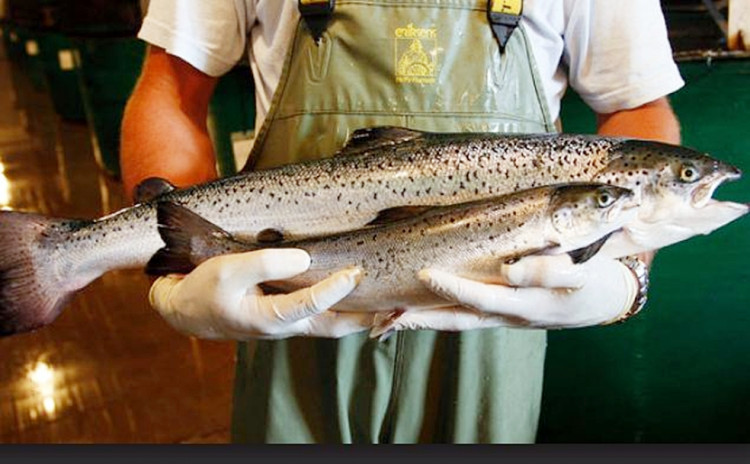The U.S. Food and Drug Administration (FDA) has allowed a U.S. firm with operations in Canada to sell genetically modified (GM) salmon in the United States.
The FDA decision, which was taken last week, means the genetically engineered Atlantic salmon raised in Canada by a Massachusetts-based firm named AquaBounty Technologies is the first animal with a modified gene structure that will be sold for human consumption in the United States.
AquaBounty has patented and trademarked this fish as the "AquAdvantage salmon." The GM salmon was first marketed to Canadians, with 4.5 metric tonnes being sold in July 2017.
The AquAdvantage salmon is a sterile Atlantic salmon female that can grow to market size in half the time of a conventional salmon. This GM salmon grows to market size in 16 to 18 months compared to wild salmon, which grows to that size in 28 to 36 months, said AquaBounty. It hoped that by introducing these fast-growing salmon, it would help ease the burden on wild populations that are being overfished.
AquaBounty also announced its intention to import salmon eggs into the United States.
"We are delighted," said AquaBounty CEO Sylvia Wulf. "We will immediately start the process to import (our) eggs from our hatchery in Canada to begin to grow out at our Indiana facility."
The FDA originally approved the sale of AquaBounty's GM salmon in 2015. The U.S. Congress, however, stopped the company from importing it from Canada while regulators crafted labeling guidelines for genetically modified food animals.
Those guidelines were issued in late 2018 with the enactment of the National Bioengineered Food Disclosure Standard. It orders that companies disclose if food is "bioengineered."
In 1989, scientists at Canada's Memorial University first began genetically engineering the salmon to grow faster than wild salmon. Dr. Garth Fletcher, now director of the Ocean Sciences Centre and Choy Hew, formerly of the Biochemistry department, formulated the idea of using gene transfer to produce strains of Atlantic salmon for aquaculture. This modified fish was to be engineered to better tolerate the harsh winter conditions that prevail in Newfoundland waters.
"It took 20 years to get it through the FDA," said Dr. Fletcher. "I never thought it would take so long. We were just the first company to take out product through the process. Once one has gone through it, though, it makes it easier for everybody else."
The FDA's decision was slammed by environmentalists and Native American groups with some threatening legal action.
A joint statement from the Center for Food Safety, Friends of the Earth, Quinault Indian Nation and Feed Seven Generations expressed concerns about the fish to human health, the environment and Native American populations whose economies rely on fishing.
"The FDA's unilateral decision, without tribal consultation, is an alarming signal that our sacred and prized wild salmon is now even more vulnerable to external markets and ecological threats," said Fawn Sharp, president of the Quinault Indian Nation.
"It's unconscionable and arrogant to think the man can improve upon our Creator's perfection in wild salmon as a justification and excuse to satisfy corporate ambition and greed."






